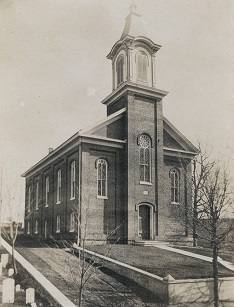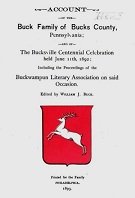
|
Johann 'Herman' Youngken |
Johann "Herman" Junghen -- Americanized to "Youngken" and other variants -- was born in 1720 in Germany. His parents, as identified by the late Donna (Younkin) Logan, were Johannes and Elisabeth (Wagner) Junghen of the town of Niederasphe in Hesse.
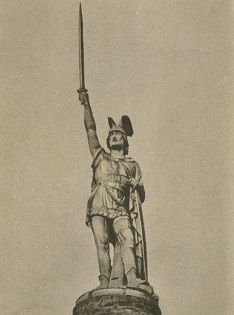
In ancient German lore, the name "Hermann the Cherusker" -- "Arminius" in Latin -- is revered as a fierce chieftain who in 9 AD convinced warring tribes to set aside their differences and repel an invading army of Romans in the Teutonburg Forest. Some historians go so far as to say the battle led to Rome's permanent withdrawal from the German region and was the Roman army's greatest defeats. In blocking a Roman takeover of German-speaking people east of the Rhine River, the victory is thought of as one of the most decisive in European if not all of human history.
Thanks to Hermann, writes Neil MacGregor in Germany: Memories of a Nation, "a nation was born out of resistance..." For many ensuing centuries his persona created deep patriotic stirrings within the German soul for a nation that did not yet exist. Today, a 90-feet-high bronze statue of Hermann stands near Detmold.
And so our Herman was honorably named. As a teenager, he migrated from the Palatinate section of Germany to the American colonies, sailing on the ship Charming Nancy, sometimes referred to as the Charming Polly. The vessel is known to have arrived in port in Philadelphia on Oct. 8, 1737.
Herman settled 40 miles north of Philadelphia in Tinicum Township, Nockamixon Township, Bucks County, PA. At some point he acquired a farm of about 100 acres.
In about 1741, he was united in matrimony with his first bride, Magdalena ( ? - ? ), said to have been of French/Bourbon origin.
The seven known offspring produced by this couple were John Youngken, Abraham Youngken Sr., Daniel Junghen, George Yonkin Sr., twins Herman Junghen Jr. and Magdalena Junghen, and Maria Catharina Haupt/Houpt.
Herman became a naturalized citizen of the American colonies' England in 1743. He retained this citizenship for three-plus decades, until the United States was formed through the Declaration of Independence and outbreak of the American Revolution. He then took an oath of allegiance to the new nation in Philadelphia in the summer of 1777 or in 1778.
Circa 1750, Herman's elder brother Johann Heinrich made his own ocean voyage to Philadelphia, also putting down roots in Bucks County.
Herman's second wife was Eva (Kressler) Shill ( ? - ? ), widow of George Shill. Their marriage took place sometime after 1749.
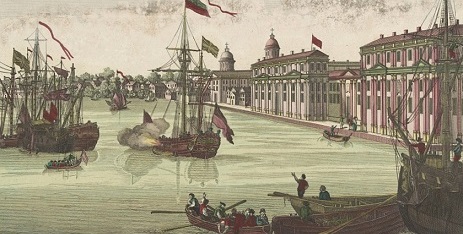 |
| Early view of the port of Philadelphia. - Courtesy Google Books |
Two children produced by the second marriage were Killian Youngken, born in 1780, and a daughter who wed (?) Ileff/Eyliff and relocated to Canada.
Herman is known to have purchased a farm of 89 acres, with the tract surveyed in his name on Dec. 3, 1754. This fact is noted in the book The History of Bucks County, authored by William Watts Hart. In the entry, his name is spelled "Younghon." The tract was sited on the Durham road and extended south into the upper end of Bucksville and later was inherited by grandson John "Nicholas" Youngken and then in 1792 acquired by Nicholas Buck.
As well, Herman and his neighbors are prominently mentioned in the book Account of the Buck Family of Bucks County, Pennsylvania, edited by William J. Buck (Philadelphia, 1893).
It can now be regarded as somewhat remarkable as the records prove that the Youngkens, Overpecks, Pearsons, Bucks, Gruvers, Frankenfields, Pursells, Hoffmans, Zeigenfooses, Zeiglers, Clemmers and some others originally settled in Springfield, and later their descendants moved southwards on the line of the Haycock Run valley and the old Durham road, instead of having arrived from below, as would have been generally expected. This was brought about through the arrival of the early immigrants at Philadelphia, proceeding up the valleys of the Schuylkill and Perkiomen, and from thence either moving directly eastwards or higher up by a semicircle southeastwards into the township of Springfield, and then later into Nockamixon and Haycock. This can be readily understood, that on a direct line from Philadelphia to Reading and to the eastward of the same was much earlier settled by the Germans than the adjacent parts of northern Bucks county, thus first following the direction of improvement and subsequently wheeling around eastwards to secure wild or unoccupied lands at lower rates, which to an industrious and frugal people with limited means was an object.
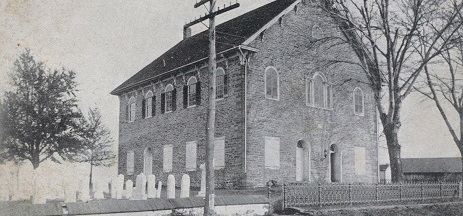 |
| Above and below left: a newer version of the Tohickon Reformed Church, where 2 of the Junghen babies were baptized. Below right: tablet at the grave of the Junghens' pastor, Rev. Johannes Conrad Würze in the Zion United Church of Christ in York, PA. |
 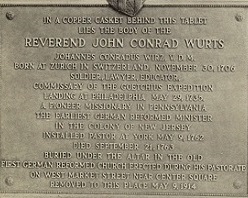 |
In the early years of their settlement, the Youngkens had to travel a sizable distance to attend church services. Writing in the article "St. Luke's Church, Nockamixon, Pa.," published in December 1911 edition of The Pennsylvania German, John A. Ruth said that:
German immigrants began to locate in Nockamixon Township, Bucks County, Pennsylvania, about 1740. It must have required no small amount of courage to settle in this region of region of swamps and rocks, where so much labor was required to clear a farm. Cheapness of land probably lured some to this section, and the Germans were not afraid of hard work. During the twenty years following 1740 there was no house of worship in the township. The nearest churches were Lower Tinicum, Tohickon, and Keller's Church, each a number of miles southward. Springfield, about five miles northwest, there was a log church as early as 1747. Old Williams Township and Saucon were many miles distant northward. If religious services were held in the township during these years, they must have been held in the log cabins of the settlers' itinerant preachers.
In fact, at the birth of their son Abraham, the baby was baptized on May 19, 1746 at the Tohickon Reformed Church, by the hand of Rev. John "Conrad" Würze (also spelled "Wuertz" and Wurts"), with Herman standing as his son's witness. Again on July 17, 1748, their infant daughter Magdalena was baptized at Tohickon, by Rev. Würze, with Barbara Marx serving as witness.
|
The new St. Luke's Lutheran Church, 1877 |
The matter went before a board of arbitrators. Their resulting decision was written in English in what is the oldest document found in the church records, with Herman included therein, his name spelled "Harman Youngham." For many years afterward, all of the church records were inscribed in German. Continuing his history of St. Luke's, Ruth wrote:
We, Joseph Insley, Peter Shepherd, and Jacob Booker, of the county of Bucks and Province of Pennsylvania do send greeting. Whereas there are several accounts depending, and divers controversies have arisen, between Michael Messer of Nockamixon township, in the county and province aforesaid on the one part, and Harman Youngham, Henry Frankenfield, Peter Hanie, Frederick Eberhard and Christian Trauger, all of Nockamixon township, ... of the other part, and whereas to putting an end to said differences, they the said Michael Messer, and Harman Youngham, Henry Frankenfield, Peter Hanie, Frederick Eberhard and Christian Trauger by their several bonds or obligations bearing date the 28th day of May last past, are become bound each to the other in the penal sum of four hundred pounds to stand, to abide, perform and keep the award, order and final determination of us the said Joseph Insley, Peter Shepherd, and Jacob Booker, or any two of us, so as the said award be made in writing, and ready to be delivered to the said parties in difference on or before the tenth day of June next as by the said obligations and conditions thereof may appear. Now know ye that we the said arbitrators whose names are hereunto subscribed and seals affixed, taking upon us the burden of the said award, and having fully examined and duly considered the proofs and allegations of the said parties, do make and publish this our award between the said parties in manner following: That is to say we do award and order that all actions, suits, quarrels and controversies whatsoever ... shall cease and be no further prosecuted, and that the said Michael Messer shall pay and bear all charges and costs in anywise relating to the disputes and differences in behalf and concerning their church, except the expense at Joseph Insley's, amounting to about one pound, which Harman Youngham, Henry Frankenfield, Peter Hanie, Frederick Eberhard and Christian Trauger shall pay, and be equally divided between them. And we do also award and order that the said Michael Messer and his party shall have privilege of the church now in dispute between the said parties to employ any Lutheran minister to preach. every other Sunday in the said meeting house without any hindrance or disturbance of the said Harman Youngham, Henry Frankenfield, Peter Hanie, Frederick Eberhard, and Christian Trauger or their parties. We do further award and order that the said Harman Youngham, Henry Frankenfield, Peter Hanie, Frederick Eberhard and Christian Trauger and their party shall also have privilege of the said church now in dispute to employ or hire any Lutheran minister to preach every other Sunday in said meeting house or church without any hindrance or disturbance of the said Michael Messer or his party. And to prevent other disputes we do order that the largest party shall have the first Sunday, and then keep every other Sunday as aforesaid until the two parties agree and be as one party, and any of the two parties shall have the privilege of employing or hiring a minister to preach to them in the said church any other day in the week, without any hindrance from the other party, and if both parties employ each a minister to preach in one day, or at one time, to prevent disputes, the party that first published that meeting to be at such a time shall not be disturbed or hindered of their sermon or meeting by the other party for that day. And we do so award and order that the said Michael Messer or his heirs. shall deliver or cause to be delivered to the said Lutheran congregation and church, for the use of the church for both parties in duc form of law, a good and lawful deed for the half acre of land' where the church now standeth, according to an agreement which by an instrument of writing shall appear bearing date the 20th day of August in the year 1761. In witness whereof we have hereunto set our hands and seals this the second day of June, One Thousand Seven Hundred and sixty four. 1764
During the summer of 1766, the congregation issued a pastoral call to Bavarian-born Rev. John Michael Enderlein (1726-1800), who had been educated at the University of Lepsic and ordained in Germany in 1751. He also was serving the Keller's Church and at Springfield at the time but accepted the invitation and began his work. The inaugural church officers of whom there is a record were deacons Christian Trauger and Frederick Eberhard. The Lutheran and Reformed elements in the congregation agreed to unite, and on Oct. 23, 1766, an agreement was executed, again naming our Herman (Section IV), and signed by the entire congregation : Johannes Henerich, Jacob E----, Johann Henrich Frankenfeld, Peter Michel, Christian Trager, Jacob Schick, Johannes Schick, Friederich Eberhard, ---- Kalb, Jacob Ruff, Friederich Mass and two others whose names could not be deciphered.
I. We the undersigned have made an agreement with Michael Messer that he shall deliver to us the church, and that it shall remain where it now is.
II. The whole congregation shall bind themselves to each other in the sum of Five Pounds, that whoever begins a quarrel shall pay the above Five Pounds into the treasury of the church.
III. The entire congregation shall assist in putting the church in order.
IV. Herman Yungheim shall have no authority to hire or to dismiss a pastor. The church however is not forbidden to him. He can attend services at any time.
V. Should anyone begin a quarrel, the congregation shall stand aloof, and let them fight it out by themselves.
VI. Neither Michael Messer or his heirs shall have any further claim upon the church or on the ground on which it is located.
VII. Michael Messer agrees that as soon as he secures a deed, or can secure one, he is in duty bound to give one to the congregation, and they are in duty bound to pay for the same.
A new building constructed in 1814, years after Herman's death, with bricklayeers brought in from Philadelphia. Services in this new structure continued to be held entirely in the German tongue until 1828. In 1877, another new building was dedicated and remains a Lutheran church today.
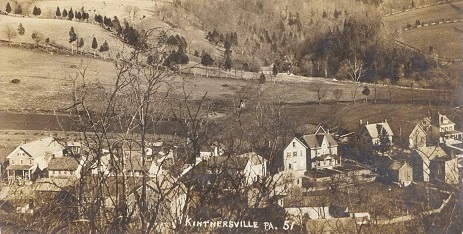 |
| Landscape in Kintnersville near the Youngken residence |
The Durham Road next to the Youngken farm in 1732 is known to have been extended north from Bristol to Newtown, through Buckingham and on to the Tohickon Creek. It was lengthened again 14 years later through Bucksville and Stony Point to Durham Furnace. Then in 1755, it was cut through to the Lehigh River at Easton. "These facts are interesting and go to show that the first settlements in Nockamixon must have been made between the years 1738 and 1750," wrote Buck. "The McCartys were here in 1743, if not, somewhat earlier, Peter Keyser before 1750, and Herman Youngken and George Overpeck four years later; we possess no evidence to this date of others having preceded them in this vicinity... Another road was laid out from Herman Youngken's house on the Durham Road by way of 'the German meeting house,' now St. Luke's Church, to Gallows Run, thence to the river Delaware. The Court, in September, 1767, ordered it to be speedily opened. Herman Youngken resided nearly half a mile above the present village and said road extended eastwardly through where is now Kintnersville."
Herman placed an announcement in the Pennsylvania Gazette in June 1769 that a black mare had strayed or been stolen from his farm at Nockamixon. The mare was four years of age, and:
...paces, trots, and hand gallops, fhod before, with old fshoes, has a remarkable running wart at the root of h er near ear, light bodied, and about 14 hands high. Whoever takes up faid mare and thief, fo that the owner may have her again, and the thief brought to jufstice, fhall have FOUR POUNDS reward, or Twenty Shillings for the mare only, and reafonable charges, paid by THOMAS BARTON, in New Britain townfhip, or faid HARMAN YOUNGKIN.
He died in Nockamixon on Feb. 28, 1788. His burial site is not known, although some researchers suggest it was in the cemetery of his house of worship, St. Luke's Church. The question was discussed in a YouTube video tour made in July 1992 by cousin researchers Donna (Younkin) Logan -- of the family of Aaron Schrock Younkin -- and Loretta (Adams) Kelldorf -- of the family of Col. John C. Younkin. Several generations of Herman's descendants are known to sleep for the ages at St. Luke's.
Herman's sons Abraham and Killian jointly inherited the farm, and with Abraham already deceeased, his son Abraham Jr. sold his share to Killian outright.
Eva's fate is not yet known. In an interesting twist, the author Buck added this in his history:
The early settlers excepting the McCartys were from Germany. Very few are found who cannot speak both English and German. The latter as spoken may be regarded as rather a dialect and to be despised by critics, yet we feel proud of it, and with our limited vocabulary of the English, we are enabled to converse with all whom we come in contact with, while our English brethren for the want of a knowledge of any other must confine themselves entirely to their own language.
|
Book naming Herman Courtesy Google Books |
I wish I had something that could be of use to you in the News Bulletin but I know of nothing that would help. Of course my personal interest in the family stops with the death of my greatgrandfather's wife, Elisabeth Youngken, in 1831... My activities in the past few years have been largely in lines far removed and not often amongst the German element. Really genealogical work is very slow at present and when I have no very active clients I busy myself with research in Philadelphia and nearby. I live very quietly since my children are all married and out of the city but I have a comfortable house and few cares and I take life easy and try to view approaching old age with equanimity.
At least eight of his direct descendants bore the name "Herman."
~ Son Daniel Junghen ~
Son Daniel Junghen ( ? - ? ) was born on (?).
Daniel was still a bachelor when named in his father's last will.
During the American Revolutionary War, in the 1775-1881 timeframe, he served in the Bucks County Militia. This service is referenced in the Pennsylvania Archives Series 5, Volume 5.
~ Son Herman Junghen/Younkin Jr. ~
Son Herman Junghen/Younkin Jr. (1748- ? ) was born on Feb. 5, 1748, a twin with his sister Magdalena.
He was a bachelor as of 1782 when listed among taxable men in Tinicum Township.
Nothing further is known.
~ Daughter Magdalena Junghenn ~
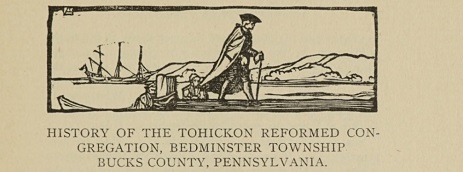 |
 |
 |
| Record of Magdalena's baptism, Tohickon Church, 1748 Courtesy A History of the Tohickon Union Church via the Internet Archive |
Daughter Magdalena Junghenn (1748- ? ) was born on Feb. 5, 1748, a twin with her brother Herman.
She received the rite of Christian infant baptism in the Tohickon Reformed Church five months later, on July 17, 1748. The sacrament was performed by Rev. John "Conrad" Würze, and was witnessed by Barbara Marx. [See the 1925 book, A History of the Tohickon Union Church, Bedminster Township, Bucks County, Pennsylvania, by William John Hinke.]
Nothing more about her life's story has been found on the research trail.
|
Copyright © 2023-2024 Mark A. Miner |
Research for this page conducted by Della Shafer and the late Donna (Younkin) Logan |
